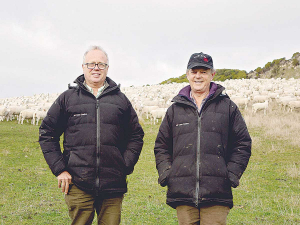Top shearers set for fast-paced speed shearing at Southern Field Days
Organisers are expecting another full field of 40 of the country’s top shearers for the popular Speed Shearing event at this year’s Southern Field Days at Waimumu.
 Shareholders Tim Chamberlain (left) and Andrew Heard are opening up Mt Cass Station on 20 November to allow farmers to see how no-shear Wiltshires perform in a low-input environment.
Shareholders Tim Chamberlain (left) and Andrew Heard are opening up Mt Cass Station on 20 November to allow farmers to see how no-shear Wiltshires perform in a low-input environment.
At a time of depressed wool prices, more and more sheep farmers are looking at reducing costs – such as shearing and parasite control.
With this in mind, Mt Cass Station will host an open day – on Friday 20 November – to give farmers an opportunity to see how no-shear Wiltshires perform in a commercial environment. The 1800ha hill country coastal property, near Waipara in North Canterbury, is farmed using organic principles. The farm is run by Sara and Andrew Heard and five other shareholders.
It is under this low-input system that Andrew Heard claims the Wiltshires come into their own. The breed’s inherent internal parasite resistance and resilience means they don’t need shearing, dagging or crutching – and they don’t get flystrike.
As Heard points out, all the jobs associated with running sheep are significantly reduced, which means savings in shearing, labour and agrichemical costs.
“They are more like running cattle,” he says.
Mt Cass has been running Wiltshires for 12 years, after purchasing its first Wiltshire rams to put across the farm’s existing mid-micron ewes, along with some Wiltshire ewe lambs.
Since then, they have breeding and selecting and now run an even line of 8,300 Wiltshire ewes alongside their Wiltshire stud, which was established to meet a growing demand for their genetics. Mt Cass will be holding its first on-farm ram and surplus ewe lambs on 20 January next year.
Heard believes there has been growing interest in Wiltshires from farmers frustrated by on-going depressed wool prices and the work associated with wool production.
He says the progression to a no-shear flock is quite rapid and in the first-cross, the progeny typically has no wool on their belly – so no belly crutching is required. Within a couple of generations, Heard claims crutching, dipping and flystrike is eliminated and within three to four generations so too is shearing.
While they don’t produce wool, the Wiltshire are good meat producers, weaning 135-145% of Mt Cass’s hill country. Around 40% of the lamb crop is sold prime pre-Christmas at 16.5-17.5kg carcass weight.
Heard, a former fine-wool producer, says Mt Cass and its organic system is an ideal testing ground for genetics. He has been impressed by the Wiltshire’s ability to perform on the hill country without the support of inputs.
“I miss the wool,” he says. “But I don’t miss producing something that’s worth nothing and has a lot of associated costs, added stress and labour.”
The World Wide Sires National All Day Breeds Best Youth Camp Best All Rounder plaudit has become family affair, with 2026 Paramount Cup winner Holly Williams following in her sister Zara's footsteps.
DairyNZ is giving New Zealand farmers a unique opportunity to gain hands-on governance and leadership experience within the dairy sector.
Herd improvement company LIC has posted a 5.2% lift in half-year revenue, thanks to increasing demand for genetics.
According to the latest Fresh Produce Trend Report from United Fresh, 2026 will be a year where fruit and vegetables are shaped by cost pressures, rapid digital adoption, and a renewed focus on wellbeing at home.
The Roar is a highlight of the game hunting calendar in New Zealand, with thousands of hunters set to head for the hills to hunt male stags during March and April.
OPINION: The past few weeks have been tough on farms across the North Island: floods and storms have caused damage and disruption to families and businesses.

OPINION: Meanwhile, red blooded Northland politician Matua Shane Jones has provided one of the most telling quotes of the year…
OPINION: This old mutt has been around for a few years now and it seems these ‘once in 100-year’ weather…